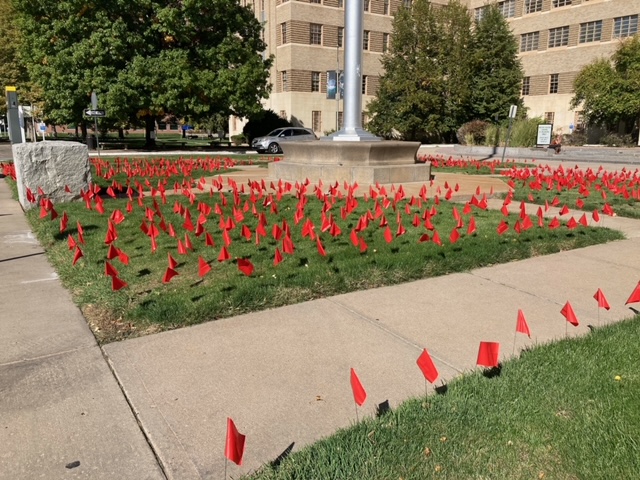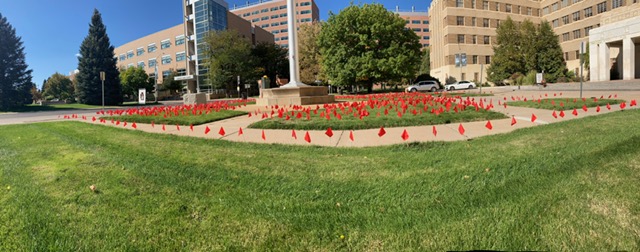The Red Flag Campaign


October is Domestic Violence Awareness Month
The Red Flag Campaign grew out of a recognized need to address and prevent sexual assault, intimate partner violence, stalking and harassment at colleges. For more information, see http://www.theredflagcampaign.org/ According to the (National Intimate Partner and Sexual Violence Survey, 2010-2012 State Report).
Nationally,
1 in 3 women and 1 in 6 men experience some form of contact sexual violence in their lifetime;
1 in 6 women and 1 in 19 men experience stalking victimization in their lifetime;
37.3% of women and 30.9% of men experience sexual violence, physical violence, and/or stalking by an intimate partner in their lifetime
You may have seen our red flags surrounding the Fitzsimmons Flag pole. There are over 1200 flags posted to represent a small population at CU Anschutz who have experienced relationship violence. If we were to accurately represent the student, staff and faculty at Anschutz (valued at 19,000 and growing) who have experienced this type of violence, we would need to post
over 7,000 flags.
We encourage you to speak up when you see signs of an abusive relationship. Domestic and sexual violence are silent epidemics that thrive in environments of secrecy and shame. When we remain silent we allow violent language, actions and people to remain the norm. We must confront and openly discuss these issues. Through our voices we have the power to demonstrate that these types of behaviors are not okay. We can use our voices to change our culture. We must not be bystanders, but must speak up when we witness this type of violence within our personal relationships, friendships and within our CU community. Stand up to this behavior. Be an UP-stander.
Not sure what to say? PCA can help.
WHAT ARE SOME EXAMPLES?
Abuse within a relationship can present in a multitude of different ways. There are many different types of abuse. Often referred to as domestic violence, dating violence, or intimate partner violence, this is a pattern of control through manipulation tactics that occur in an intimate, romantic relationship. The way this violence can present itself can include, but is not limited to any of the following:
Financial
- Preventing you from making purchases without discussion.
- Withholding access to money for necessary items.
- Monitoring spending without your consent; questioning you about every purchase you make.
Emotional & Psychological
- Telling you that you never do anything right.
- Showing extreme jealousy if you spend time with others.
- Preventing you from spending time with friends, family, peers ("Why do you need friends, you have me")
- Monitoring your activities with or without your knowledge.
- Gaslighting- pretending to not understand you or questioning your recollection, denying previous statements they made (often referred to as "crazy-making").
- For more information on gaslighting, see https://www.thehotline.org/resources/what-is-gaslighting/
There are often misconceptions about physical violence within an abusive relationship. We often think of domestic violence synonymous with a black eye or broken arm. Physical violence is typically the last type of violence that an abusive person may use. Often used as a scare tactic, an abusive partner will use all other forms of control to manipulate their partner prior to using physical violence. They create an atmosphere of fear, forcing their partner to "walk on eggshells" to avoid or minimize possible future physical harm.
- Trapping you or restricting you from leaving or entering a space.
- Using weapons against a person to control their actions.
- Throwing items at you.
- Shoving, slapping, kicking, hitting (not retaliatory).
- Intentionally driving recklessly while you’re in the car.
Spiritual
- Using scripture or beliefs to humiliate you or to get you to do what they want.
- Forcing your partner to attend service.
- Requiring your partner to adhere to strict religious guidelines when they do not want to.
Sexual
- Manipulating you to have sex or perform sexual acts you are not comfortable with.
- Implying you owe your partner something sexual in exchange for previous acts, gifts etc. or
- Sexual assault.
- Pressuring or forcing your partner into sexual acts because of the relationship status.
If you or someone you know has experienced any of the above and you would like more information, please reach out to us.
You are not alone.